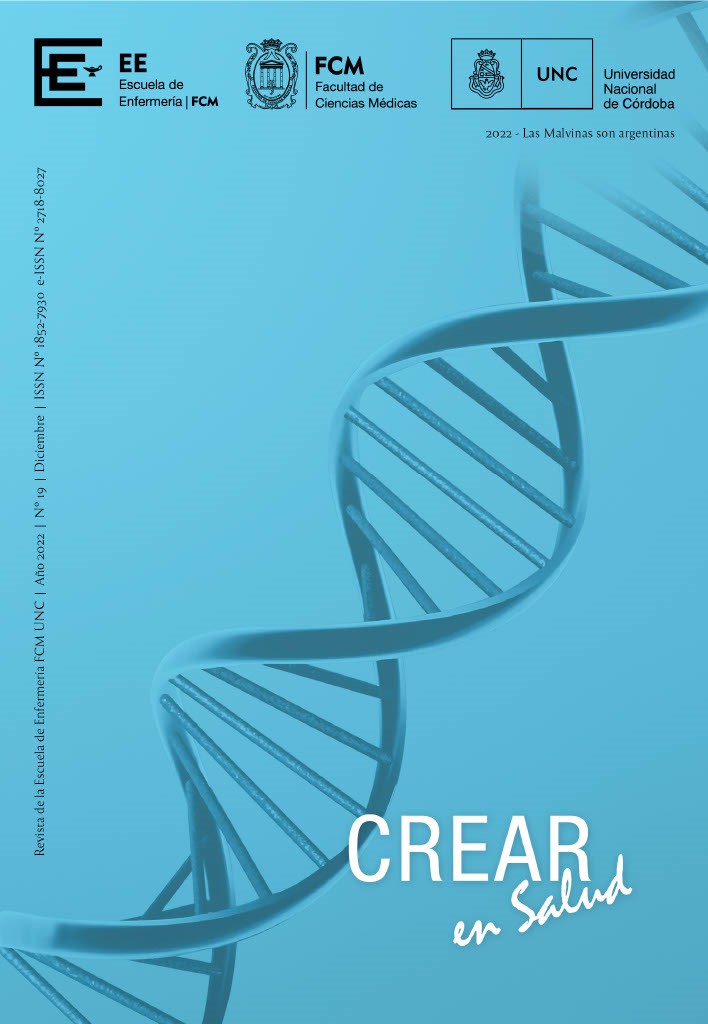Opinion on the characteristics of events supposedly of attributable to vaccination and immunization (ESAVI)
Keywords:
Opinion. Vaccines. ESAVI. Healthcare team.Abstract
Introduction: The Covid-19 disease is a virus that causes respiratory infections. In virtue of the importance of vaccination, the government of Córdoba, with the aim of providing a new service to the community, inaugurated on the 29th of December of 2020 the first vaccination facility of the city of Córdoba at the Kempes Convention Center and it allowed adults to receive immunity against Covid-19. Simultaneously, other centers were incorporated. In fact, the following observations arise: the users attend consultations between doses after having presented fever and weakness; besides, these manifestations become more acute in older ages. Effects become more evident with the second dose and manifest local pain, which is related to the use of a different technique when applying the first and second doses. As a consequence, it was decided to carry out the study Opinion on the Characteristics of Events Supposedly Attributable to Vaccination and Immunization (ESAVI). Objective: To determine the opinion of the healthcare team and of the population about the characteristics of the ESAVI in an adult population over 18 years of age at the Covid vaccination facility Autovac Kempes in the capital of Córdoba in March of
2022. Methodology: A descriptive, cross-sectional study was performed. Variables: Opinions about the characteristics of the ESAVI and dimensions such as the opinion about the vaccine, the brand of the vaccine, the place of inoculation in the body and the opinion about preexisting diseases. Universe: Healthcare team consisting of doctors, nurses of the facility and the general public. Sample: 218 users of the vaccination facility and personnel of the healthcare team. Primary source: A Google Forms survey was used for data collection. Results: According to the opinion of the population, there were side effects attributable to the vaccine which exacerbated preexisting diseases with an increase of local and systemic reactions as opposed to the opinion of the healthcare team, which considered that the reported results coincide with the expected effects of any other vaccine. Discussion and conclusions: The WHO report (2021) claims that some of the typical side effects are pain in the place of inoculation, fever, tiredness, headache, myalgias, chills and diarrhea. The probability of these effects occurring varies depending on the vaccine and the body. The Covid-19 vaccines only provide protection against the SARSCoV-2 virus; thus, it is important to maintain a good health condition, which coincides with the findings of this study.
Downloads
References
Centro para el control y prevención de enfermedades. (2021). Vacunas contra el COVID- 19 para personas que están moderada o gravemente inmunodeprimidas. https://www.argentina.gob.ar/coronavirus/protocolosgclid=EAIaIQobChMI2bysr5qOwIV4AqtBh027QCoEAAYASAAEgLO1PD_BwE
Cruz Rodríguez, E., Galindo Santana, B., & Toledo Rodríguez, G. (2019). Vigilancia de los eventos adversos atribuidos a la inmunización. Revista Cubana de Higiene y Epidemiología,56(1). http://www.revepidemiologia.sld.cu/index.php/hie/article/view/207
Díaz-Castrillón, F. J. y Toro-Montoya, A. I. (2020). SARS-CoV2/COVID-19: el virus, la enfermedad y la pandemia. Revista: Medicina & Laboratorio. Vol. 24 N° 3: 183-205. Colombia. https://medicinaylaboratorio.com/index.php/myl/article/view/268/256
Díaz Mato, I.; Chao Cardeso, A. L.; Jiménez López, G., & López Valdés, Y. (2010). Caracterización de eventos adversos asociados a vacunas que inmunizan contra enfermedades infecciosas. Años 2006-2007. Rev. Cubana Farm. v.44 n.3 Ciudad de la Habana jul.-sep. 2010. http://scielo.sld.cu/scielo.php?script=sci_arttext&pid=S0034-75152010000300006
Gobierno de la República Argentina. (2020). Decreto N° 260/2020 DNU. Ciudad Autónoma de Buenos. Aires: InfoLEG. Información Legislativa. http://servicios.infoleg.gob.ar/infolegInternet/anexos/335000-339999/335423/ texact.htm
Hui, D. S. C. y Zumla, A., (2019). Síndrome respiratorio agudo severo: características históricas, epidemiológicas y clínicas. National Library of Medicine. PubMed.gov https://pubmed.ncbi.nlm.nih.gov/31668196/
Ministerio de Salud de la Nación Argentina. (2020). Coronavirus. COVID-19. Información, recomendaciones y medidas de prevención. Argentina. gov.ar https://www.argentina.gob.ar/salud/coronavirus-COVID-19
Ministerio de Salud de la Nación Argentina. (2021). Eventos adversos supuestamente atribuibles a la vacunación e inmunización (ESAVI). Argentina.gov.ar https://www.argentina.gob.ar/anmat/farmacovigilancia/notificanos/eventosadversos-esavi
Organización Mundial de la Salud. (2017). Inmunización. Oficina Regional para las Américas de la Organización Mundial de la Salud. https://www.paho.org/es/temas/inmunizacion
Organización Mundial de la Salud. OPS. (2020). Enfermedad por el coronavirus (COVID-19): Vacunas. https://www.who.int/es/emergencies/diseases/novel-coronavirus-2019/question-and-answers-hub/q-a-detail/coronavirus-disease-(covid-19)-vaccines?adgroupsurvey={adgroupsurvey}&gclid=EAIaIQobChMIhpHGpp-O-wIVJilMCh3N-wriEAAYAiAAEgJouvD_BwE
Organización Mundial de la Salud. OPS. (2021). Efectos secundarios de las vacunas contra la COVID-19. [Sitio web]. https://www.who.int/es/news-room/feature-stories/detail/side-effects-of-covid-19-vaccines
Rodríguez, E. C.; Galindo Santana, B. M.; y Toledo Rodríguez, G. P. (2018). Vigilancia de los eventos adversos atribuidos a la inmunización. Higiene y Epidemiología. http://www.revepidemiologia.sld.cu/index.php/hie/article/view/207/267
Unidad Coordinadora Nacional de Farmacovigilancia. (2007). Informe anual, 2007. Cuba. https://files.sld.cu/cdfc/files/2010/02/informe-anual-2007.pdf
Whittembury, Á. y Ticona, M. (2009). Eventos Supuestamente Atribuidos a Vacunación o Inmunización (ESAVI). Revista Peruana de Epidemiología, vol. 13, núm. 3, diciembre, 2009, pp. 1-12. Sociedad Peruana de Epidemiología. Lima, Perú. https://www.redalyc.org/pdf/2031/203120367002.pdf
Downloads
Published
How to Cite
Issue
Section
License

This work is licensed under a Creative Commons Attribution-NonCommercial 4.0 International License.



